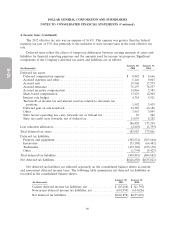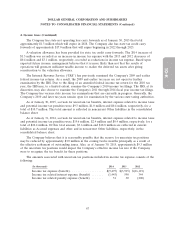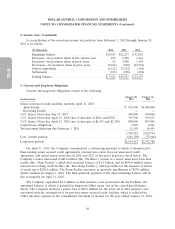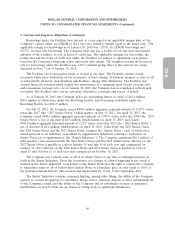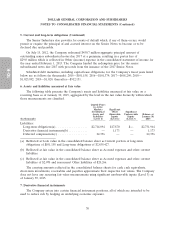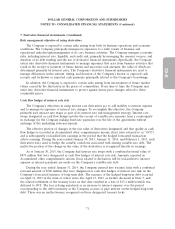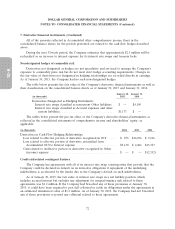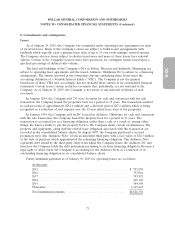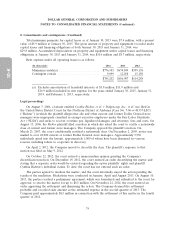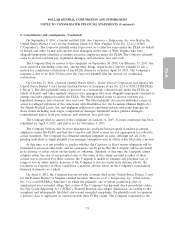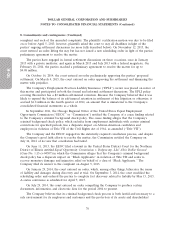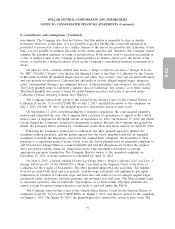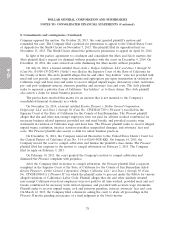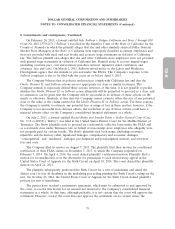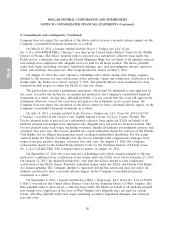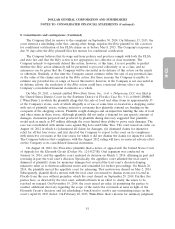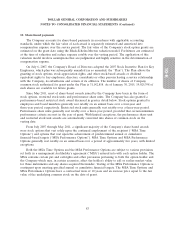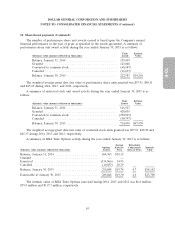Dollar General 2014 Annual Report Download - page 150
Download and view the complete annual report
Please find page 150 of the 2014 Dollar General annual report below. You can navigate through the pages in the report by either clicking on the pages listed below, or by using the keyword search tool below to find specific information within the annual report.
10-K
DOLLAR GENERAL CORPORATION AND SUBSIDIARIES
NOTES TO CONSOLIDATED FINANCIAL STATEMENTS (Continued)
8. Commitments and contingencies (Continued)
complaint and each of the amended complaints. The plaintiffs’ certification motion was due to be filed
on or before April 5, 2013; however, plaintiffs asked the court to stay all deadlines in light of the
parties’ ongoing settlement discussions (as more fully described below). On November 12, 2013, the
court entered an order lifting the stay but has not issued a new scheduling order in light of the parties’
preliminary agreement to resolve the matter.
The parties have engaged in formal settlement discussions on three occasions, once in January
2013 with a private mediator, and again in March 2013 and July 2013 with a federal magistrate. On
February 18, 2014, the parties reached a preliminary agreement to resolve the matter for up to
$4.08 million.
On October 16, 2014, the court entered an order preliminarily approving the parties’ proposed
settlement. On March 4, 2015, the court entered an order approving the settlement and dismissing the
matter with prejudice.
The Company’s Employment Practices Liability Insurance (‘‘EPLI’’) carrier was placed on notice of
this matter and participated in both the formal and informal settlement discussions. The EPLI policy
covering this matter has a $2 million self-insured retention. Because the Company believed that it was
likely to expend the balance of its self-insured retention in settlement of this litigation or otherwise, it
accrued $1.8 million in the fourth quarter of 2012, an amount that is immaterial to the Company’s
consolidated financial statements as a whole.
In September 2011, the Chicago Regional Office of the United States Equal Employment
Opportunity Commission (‘‘EEOC’’ or ‘‘Commission’’) notified the Company of a cause finding related
to the Company’s criminal background check policy. The cause finding alleges that the Company’s
criminal background check policy, which excludes from employment individuals with certain criminal
convictions for specified periods, has a disparate impact on African-American candidates and
employees in violation of Title VII of the Civil Rights Act of 1964, as amended (‘‘Title VII’’).
The Company and the EEOC engaged in the statutorily required conciliation process, and despite
the Company’s good faith efforts to resolve the matter, the Commission notified the Company on
July 26, 2012 of its view that conciliation had failed.
On June 11, 2013, the EEOC filed a lawsuit in the United States District Court for the Northern
District of Illinois entitled Equal Opportunity Commission v. Dolgencorp, LLC d/b/a Dollar General
(Case No. 1:13-cv-04307) in which the Commission alleges that the Company’s criminal background
check policy has a disparate impact on ‘‘Black Applicants’’ in violation of Title VII and seeks to
recover monetary damages and injunctive relief on behalf of a class of ‘‘Black Applicants.’’ The
Company filed its answer to the complaint on August 9, 2013.
On January 29, 2014, the court entered an order, which, among other things, bifurcates the issues
of liability and damages during discovery and at trial. On September 3, 2014, the court modified the
scheduling order and ordered the parties to complete fact discovery related to liability by May 15, 2015.
A status conference is scheduled for April 7, 2015.
On July 29, 2014, the court entered an order compelling the Company to produce certain
documents, information, and electronic data for the period 2004 to present.
The Company believes that its criminal background check process is both lawful and necessary to a
safe environment for its employees and customers and the protection of its assets and shareholders’
76


